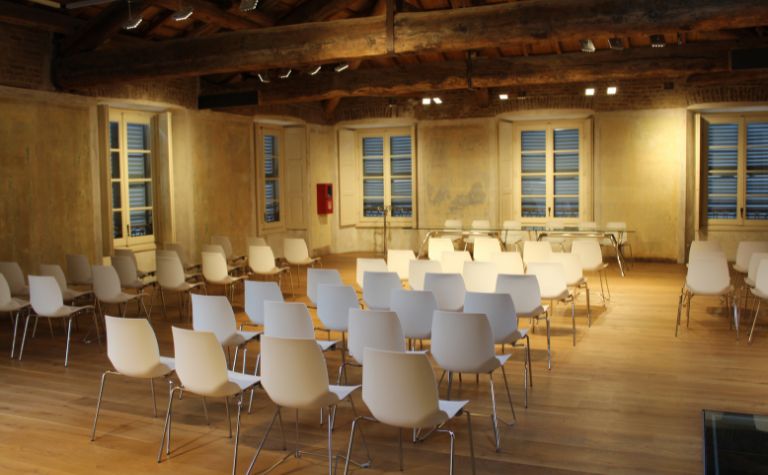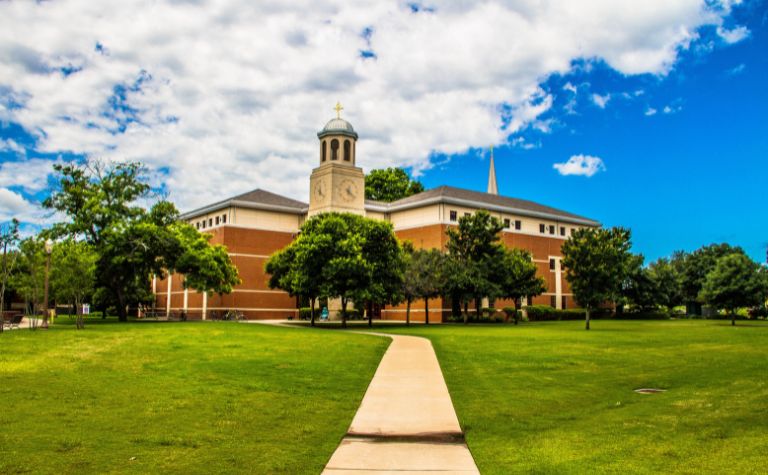Seminaries have long been the bedrock of theological education, shaping the minds and spirits of those who lead and guide communities worldwide.
Protestant and Roman Catholic traditions have established seminaries to train their future leaders, each with its distinct approach and emphasis.
This article seeks to shed light on the similarities and differences between Protestant and Roman Catholic seminaries, offering insights into their respective educational structures, curricula, and overall objectives.
As we journey through this comparison, readers will gain a clearer understanding of how each tradition prepares its leaders for service.

Comparing Catholic and Protestant Seminaries: An Overview
The word “seminary” originates from the Latin “seminarium,” meaning “seed plot” or “plant nursery.” This term was derived from “semen” or “seminis,” which means “seed.”
Over time, “seminary” evolved to describe an institution for training priests, reflecting the idea of nurturing spiritual growth.
| Catholic Seminaries | Protestant Seminaries | |
|---|---|---|
| Primary Purpose | Prepare men for the priesthood | Prepare individuals for ministry, both lay and ordained |
| Historical Background | Rooted in ancient Christian traditions | Often tied to Reformation movements |
| Educational Structure | Typically includes philosophy and theology studies | Broad theological studies, often with various denominational focuses |
| Curriculum Focus | Sacraments, Canon Law, Patristics | Biblical studies, church history, pastoral care |
| Sacramental Training | In-depth training in seven sacraments | Varies; some traditions emphasize sacraments, others ordinances |
| Practical Experience | Internships, pastoral assignments | Internships, church planting, missions |
| Degree Conferred | Bachelor of Sacred Theology (S.T.B.), Licentiate of Sacred Theology (S.T.L.), Doctor of Sacred Theology (S.T.D.) | Master of Divinity (M.Div.), Master of Theology (Th.M.), Doctor of Ministry (D.Min.) |
| Admission Requirements | Often requires discernment process, recommendation from bishop | Varies; typically a bachelor’s degree, letters of recommendation |
| Campus Life | Community living, daily liturgy | Varies; some have community worship, others emphasize individual church involvement |
| Post-Seminary Careers | Priesthood, chaplaincy, teaching, diocesan leadership | Pastoral ministry, missionary work, counseling, academic careers, nonprofit work |

The History of Catholic and Protestant Seminaries
The concept of a seminary, or an institution dedicated to training clergy and spiritual leaders, has deep roots in Protestant and Roman Catholic traditions.
The Roman Catholic Church established its seminaries in the wake of the Council of Trent in the 16th century.
This move aimed to standardize clergy education and ensure priests were well-prepared doctrinally and spiritually.
These institutions emphasized Latin, theology, and pastoral care, laying the foundation for the modern Catholic seminary system.
On the other hand, Protestant seminaries emerged during the Reformation, as various denominations sought to train ministers who could teach and uphold their distinct doctrines.
Institutions like the University of Wittenberg, where Martin Luther taught, became models for Protestant theological education.
Over time, as Protestantism branched into various denominations, each developed its seminaries, emphasizing both academic rigor and denominational distinctives.

Differences in Educational Approach
Protestant and Roman Catholic seminaries prioritize a comprehensive education for their students, but the structure and focus can vary based on tradition and denominational specifics.
In Roman Catholic seminaries, the educational journey is often longer, typically spanning seven to eight years.
This period is divided into two main phases: the philosophical studies, which last for about two to three years, and the theological studies, which take up the remaining four to five years.
This structure ensures that students receive a solid foundation in Church teachings, Canon Law, liturgy, and pastoral care.
Additionally, many Catholic seminaries incorporate a spiritual or pastoral year, dedicated to deepening one’s spiritual life or gaining practical experience in a parish setting.
On the other hand, Protestant seminaries often offer a three-year Master of Divinity (M.Div.) program as their primary path for pastoral preparation.
This program combines biblical studies, theology, church history, and practical ministry skills.
Some Protestant seminaries also offer shorter Master of Arts or Master of Theological Studies programs, focusing on specific areas of study.
Unlike the fixed structure in many Catholic seminaries, Protestant institutions might offer more flexibility, allowing students to tailor their education based on their intended ministry focus or academic interests.
The Curriculum Focus in Each Seminary Tradition
The curriculum in both Protestant and Roman Catholic seminaries revolves around preparing students for ministry, but the specific areas of emphasis can differ based on the traditions and teachings of each denomination.
Roman Catholic seminaries strongly emphasize understanding the traditions, teachings, and practices of the Catholic Church.
Key subjects include sacramental theology, Canon Law, Church history, and moral theology.
Although not universally required, Latin is often part of the curriculum given its significance in Church documents and liturgy.
Additionally, pastoral theology courses prepare students for the practical aspects of parish life, from administering sacraments to counseling parishioners.
Protestant seminaries, while also rooted in tradition, often have a broader range of theological perspectives represented in their curriculum.
Core subjects typically include Old and New Testament studies, systematic theology, Church history, and pastoral care.
Depending on the seminary’s denominational affiliation or theological stance, there might be a stronger emphasis on subjects like evangelism, missions, or specific theological viewpoints.
Practical ministry courses, such as preaching, counseling, and leadership, are also integral to the curriculum.
Sacramental Training
Sacramental training is a distinctive component of seminary education, especially when comparing Protestant and Roman Catholic traditions.
In Roman Catholic seminaries, sacramental training is central.
Students are taught the significance, administration, and rituals associated with the seven sacraments: Baptism, Confirmation, Eucharist, Penance, Anointing of the Sick, Holy Orders, and Matrimony.
This training is crucial as priests play a primary role in administering most of these sacraments.
Emphasis is placed on understanding each sacrament’s theological foundations, historical developments, and practical aspects.
On the other hand, Protestant seminaries approach sacraments differently, often referring to them as “ordinances.”
Typically, Protestant traditions recognize two main sacraments or ordinances: Baptism and the Lord’s Supper (or Communion).
The focus in Protestant seminaries is on understanding the symbolic significance of these acts and their role in the life of the believer and the community.
The methods of administration, frequency, and associated rituals can vary widely among Protestant denominations, and seminary training reflects these differences.
Despite the variations in sacramental training between the two traditions, both aim to equip future leaders with a deep understanding and appreciation of these sacred practices, ensuring they are carried out with reverence and integrity.
Practical Experience and Internships
Practical experience is vital to seminary education, providing students with hands-on opportunities to apply their academic knowledge in real-world settings.
In Roman Catholic seminaries, students undergo specific periods of pastoral formation.
This often includes assignments in parishes, hospitals, and other institutions where they can engage in pastoral care, liturgical duties, and community outreach.
These experiences are designed to prepare them for the diverse challenges they’ll face as priests, from administering sacraments to providing spiritual guidance.
Protestant seminaries, on the other hand, emphasize internships and field education.
Students are often placed in local churches, non-profit organizations, or mission fields, depending on their area of interest and vocational goals.
Here, they get to preach, lead Bible studies, offer pastoral counseling, and participate in community engagement.
This hands-on training is tailored to equip them for various ministry roles as pastors, missionaries, or chaplains.
Degree and Titles Conferred
The culmination of seminary education often results in the conferral of specific degrees and titles, reflecting the depth and specialization of study.
In Roman Catholic seminaries, the primary degree awarded is the Bachelor of Sacred Theology (S.T.B.), followed by the Licentiate of Sacred Theology (S.T.L.) for those pursuing further studies.
For those aiming for the highest academic qualification, the Doctor of Sacred Theology (S.T.D.) is conferred.
Upon completion of their studies and other requirements, candidates are ordained as priests, receiving the title “Father.”
Protestant seminaries offer a range of degrees based on the course of study.
The Master of Divinity (M.Div.) is the standard professional degree for pastoral ministry.
Other degrees include the Master of Arts (M.A.) in various specializations, Master of Theology (Th.M.), and Doctor of Ministry (D.Min.).
For those pursuing academic careers, the Doctor of Philosophy (Ph.D.) in theological studies is available.
Graduates may take on various titles such as “Pastor,” “Reverend,” or “Doctor,” depending on their role and the tradition of their denomination.
While the degrees and titles may differ, both Roman Catholic and Protestant seminaries aim to equip their students with the knowledge and skills necessary for effective leadership and service in their communities.
Admission Requirements
Gaining admission to a seminary, whether Roman Catholic or Protestant, involves meeting specific criteria that reflect the institution’s mission and the demands of the programs offered.
For Roman Catholic seminaries, potential candidates typically need to:
- Be a baptized and confirmed member of the Roman Catholic Church.
- Obtain a recommendation or sponsorship from a bishop or religious superior.
- Complete a period of discernment or pre-seminary formation.
- Undergo psychological and medical evaluations.
- Provide academic transcripts, often requiring a bachelor’s degree or its equivalent.
- Participate in interviews with seminary officials or vocation directors.
Protestant seminaries have a varied set of requirements based on denomination and institutional preferences. Common criteria include:
- Membership or affiliation with a Protestant denomination, though many seminaries are open to students from various Christian traditions.
- A bachelor’s degree from an accredited institution.
- Submission of academic transcripts and letters of recommendation.
- A written statement of purpose or personal essay detailing the applicant’s vocational goals and reasons for pursuing seminary education.
- Interviews may also be part of the process, depending on the institution.
Campus Life and Community
A seminary’s atmosphere and community dynamics play a pivotal role in shaping the experiences of its students.
Both Roman Catholic and Protestant seminaries prioritize fostering a sense of community, though the nature and activities might differ.
In Roman Catholic seminaries:
- Life is often structured around daily routines, including communal meals, prayers, and liturgical celebrations.
- Students might live on campus in a residence hall or a specific house of formation.
- There’s an emphasis on personal and communal spiritual growth, with opportunities for retreats and spiritual direction.
- Activities often include group discussions, workshops, and community outreach projects.
- Interaction with the broader community, both within and outside the church, is encouraged to prepare students for pastoral roles.
On the other hand, Protestant seminaries:
- Offer a diverse range of living arrangements, from on-campus housing to off-campus apartments.
- Daily and weekly chapel services are common, providing moments for the community to gather.
- Students often participate in small group discussions, peer mentorship programs, and community-building events.
- Outreach and mission trips, both local and international, are frequently organized.
- Many institutions host conferences, guest lectures, and workshops, allowing students to engage with broader theological and societal discussions.
Career Paths Post-Seminary
After completing their studies at a seminary, graduates are equipped with unique skills and knowledge that can be applied in various professional settings.
The career paths available often reflect their respective seminaries’ teachings and traditions.
For Roman Catholic seminary graduates:
- Priesthood: Many pursue ordination to serve as priests in parishes, providing spiritual guidance and conducting liturgical services.
- Chaplaincy: Some work in hospitals, prisons, or the military, offering support and comfort to those in need.
- Teaching: With advanced degrees, they can teach theology or philosophy at high schools or universities.
- Diocesan Leadership: Roles in diocesan offices or as bishops are possibilities for those who show leadership potential and experience.
- Lay Ministries: Not all graduates become priests. Some take on roles in youth ministry, social justice initiatives, or pastoral counseling.
For Protestant seminary graduates:
- Pastoral Ministry: Many serve as pastors or ministers in local congregations, leading worship services and community programs.
- Missionary Work: Some feel called to serve in international contexts, sharing their beliefs and assisting communities.
- Counseling: With additional training, they can become counselors or therapists, focusing on spiritual or general life challenges.
- Academic Careers: Those with a passion for research and teaching might pursue roles in higher education, contributing to theological scholarship.
- Nonprofit Work: Leveraging their understanding of community and service, some work in nonprofit organizations, addressing societal issues and promoting positive change.
While these are common career paths, the versatility of a seminary education means graduates can also find roles in areas like writing, administration, and more. The foundational goal remains consistent: to serve and make a positive impact in diverse settings.
Recent Posts
David Jeremiah, a renowned pastor, author, and speaker, has captivated the hearts of many with his compelling sermons. His messages resonate deeply with diverse audiences, leaving an enduring...
Tim Keller, a distinguished pastor, theologian, and author, has garnered a devoted following through the profound impact of his sermons. In this article, we will explore seven compelling reasons...
